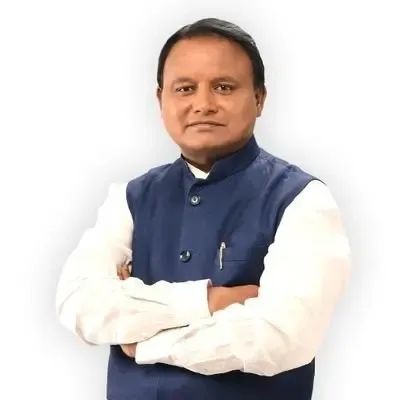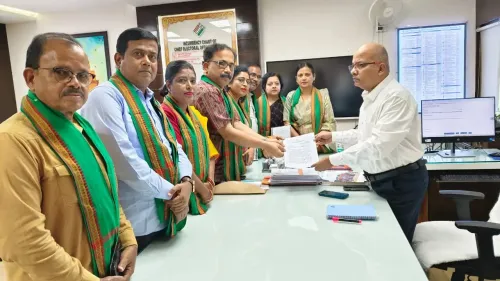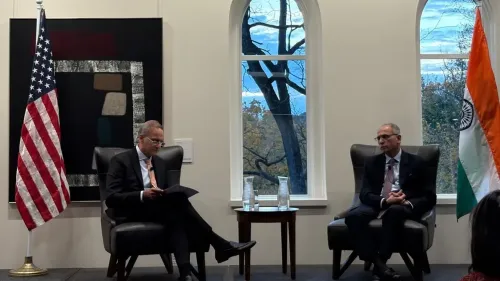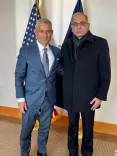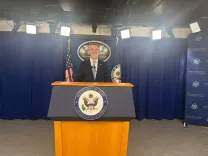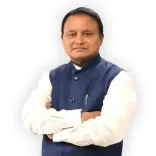Today, India's Economy Shapes Global Trends: President Praises Farmers and Workers
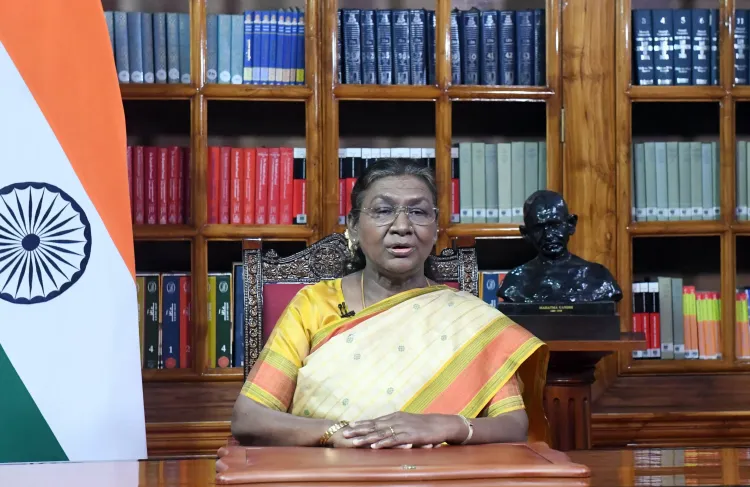
Synopsis
Key Takeaways
- President Murmu's Address: Celebrating 76th Republic Day.
- Economic Influence: India's economy now shapes global trends.
- Constitutional Legacy: 75 years of guiding progress.
- Inclusivity: Focus on financial and social inclusion.
- Sustainable Development: Commitment to environmental initiatives.
New Delhi, Jan 25 (NationPress) President Droupadi Murmu on Saturday delivered an address to the nation on the eve of the 76th Republic Day.
During her address, the President praised the tireless contributions of farmers, workers, scientists, and young Indians for their essential roles in the nation’s progress, which is now starting to shape global economic patterns.
Here is the complete text of the President’s address:
My Dear Fellow Citizens,
Namaskar!
I am pleased to speak to you on this momentous occasion. On the eve of Republic Day, I extend my warmest congratulations! On January 26, 75 years ago, our foundational document, the Constitution of India, was enacted.
After nearly three years of deliberations, the Constituent Assembly adopted the Constitution on November 26, 1949. This date has been commemorated as Samvidhan Divas, or Constitution Day, since 2015.
Republic Day is a celebration of unity and pride for all citizens. Seventy-five years may seem like an instant in a nation’s life, but I assert that it has been a significant period. This is the time when the long-silent spirit of India has reawakened, striving to reclaim its rightful position among nations. Once one of the world’s oldest civilizations known for its knowledge and wisdom, India faced a dark era of colonial exploitation resulting in severe poverty.
Today, we must first honor the courageous individuals who sacrificed greatly to liberate our motherland from foreign oppression. Some are well-remembered, while others have only recently begun to receive acknowledgment. This year marks the 150th birth anniversary of Bhagwan Birsa Munda, a symbol of the freedom fighters whose contributions to our national narrative are finally being recognized.
In the early 20th century, their struggles coalesced into a widespread independence movement. India was fortunate to have figures like Mahatma Gandhi, Rabindranath Tagore, and Babasaheb Ambedkar, who helped rekindle our democratic values. Concepts of justice, liberty, equality, and fraternity are not merely modern ideals; they are ingrained in our civilizational legacy. This explains why the skeptics who doubted the potential of our Constitution and Republic at independence were proven completely mistaken.
The diversity of our Constituent Assembly reflected our republican principles, with representatives from all regions and communities, including 15 women, such as Sarojini Naidu, Rajkumari Amrit Kaur, Sucheta Kripalani, Hansaben Mehta, and Malati Choudhury. During a time when women’s equality was a distant goal in many parts of the world, Indian women played a crucial role in shaping the nation’s future.
The Constitution has become a dynamic document, as civic values have long been part of our ethical framework. It serves as the foundation of our collective identity as Indians, uniting us as a family. For 75 years, it has steered our progress. Today, let us express our heartfelt gratitude to Dr. Ambedkar, who led the Drafting Committee, the esteemed members of the Constituent Assembly, and all those who worked diligently to gift us this remarkable document.
Dear Fellow Citizens,
The past 75 years under the Constitution have been marked by the comprehensive advancement of our young republic. At the time of Independence and beyond, many regions faced extreme poverty and hunger. However, our self-belief remained intact. We committed ourselves to creating conditions where every individual could thrive. Our farmers labored diligently, achieving food self-sufficiency for our nation. Our workers devoted themselves tirelessly to enhancing our infrastructure and manufacturing sectors. Thanks to their exceptional contributions, India’s economy now influences global economic trends. Today, India is taking on leadership roles in international forums. Such transformation owes much to the framework established by our Constitution.
In recent times, the economic growth rate has consistently remained high, generating employment opportunities for our youth, increasing financial resources for farmers and laborers, and lifting many out of poverty. The bold and visionary economic reforms will sustain this momentum in the future. Inclusivity is the cornerstone of our growth narrative, ensuring that the benefits of development reach as many people as possible.
The Government continues to prioritize financial inclusion, expanding initiatives like Pradhan Mantri Jan Dhan Yojana, Pradhan Mantri Jeevan Jyoti Bima Yojana, Pradhan Mantri Suraksha Bima Yojana, MUDRA, Stand-Up India, and Atal Pension Yojana to provide more individuals access to a variety of financial support systems.
Equally crucial, the government has redefined welfare, establishing basic necessities such as housing and access to clean drinking water as entitlements. Every effort is underway to assist marginalized communities, particularly those from Scheduled Castes, Scheduled Tribes, and Other Backward Classes. For instance, there are pre-matric and post-matric scholarships, national fellowships, overseas scholarships, hostels, and coaching facilities for youth from SC communities. The Pradhan Mantri Anusuchit Jaati Abhyuday Yojana is making strides to alleviate poverty among SC communities by creating employment and income-generating opportunities. Dedicated initiatives are also in place for the socio-economic upliftment of ST communities, including Dharti Aaba Janjatiya Gram Utkarsh Abhiyan and Pradhan Mantri Janjati Adivasi Nyaya Maha Abhiyan (PM-JANMAN). A Development and Welfare Board has been formed for the De-notified, Nomadic, and Semi-Nomadic Communities.
Meanwhile, the focus on enhancing physical infrastructure, including roads, railways, ports, and logistics hubs, over the last decade has laid the groundwork for sustainable growth in the years to come.
The government's use of technology in finance has been exemplary. A plethora of digital payment options and a direct benefit transfer system have fostered inclusion, incorporating many individuals into the formal economy. This has also ushered in unprecedented transparency. In just a few years, we have established a robust Digital Public Infrastructure that ranks among the finest globally.
The banking system has shown resilience following a series of bold initiatives like the Insolvency and Bankruptcy Code, significantly reducing the Non-Performing Assets of Scheduled Commercial Banks.
Dear Fellow Citizens,
We achieved our freedom in 1947, yet remnants of a colonial mindset lingered for years. Recently, we have witnessed concerted efforts to transform that mindset. A notable initiative was the decision to replace the Indian Penal Code, the Code of Criminal Procedure, and the Indian Evidence Act with the Bharatiya Nyaya Sanhita, Bharatiya Nagarik Suraksha Sanhita, and Bharatiya Sakshya Adhiniyam. These new laws, rooted in Indian jurisprudence, prioritize delivering justice over punishment in our criminal justice framework. Furthermore, they emphasize protecting women and children from crimes.
Such large-scale reforms require bold vision. Another initiative poised to redefine good governance is the Bill proposed in Parliament to synchronize election schedules across the country. The 'One Nation One Election' plan could enhance governance consistency, prevent policy stagnation, mitigate resource misallocation, and lessen financial burdens while providing numerous additional benefits.
Simultaneously, there has been renewed engagement with our civilizational heritage. The ongoing Mahakumbh exemplifies the richness of that heritage. Exciting cultural initiatives are underway to preserve and revitalize our traditions.
India boasts immense linguistic diversity. To celebrate and conserve this richness, the Government has designated Assamese, Bengali, Marathi, Pali, and Prakrit as classical languages. This category already includes Tamil, Sanskrit, Telugu, Kannada, Malayalam, and Odia. The Government is actively promoting research in 11 classical languages.
I eagerly anticipate the completion of India's first Archaeological Experiential Museum in Vadnagar, Gujarat, adjacent to an excavation site indicating human habitation from around 800 BCE. This museum will showcase a wide range of arts, crafts, and cultural elements from various eras.
Dear Fellow Citizens,
Ultimately, it is our youth who will shape the India of tomorrow. Education is pivotal in shaping these young minds. Therefore, the Government has increased its investment in education and made significant efforts to enhance every aspect of this sector. The outcomes thus far are promising. The past decade has transformed education in terms of learning quality, physical infrastructure, and digital accessibility. Regional languages are being promoted as mediums of instruction at more levels. It is no surprise that student performance has shown remarkable improvement. I am pleased to note that women teachers have played a vital role in this transformation, as over 60% of new teachers in the last decade are women.
The expansion and integration of vocational and skill education is a welcome advancement. This is further complemented by initiatives providing youth with internship opportunities in the corporate sector.
With a more robust foundation in school-level education, India is reaching new heights in various fields of knowledge, particularly in science and technology. For example, India ranks sixth globally in terms of intellectual property filings. We have consistently improved our position in the Global Innovation Index, advancing from 48th place in 2020 to 39th in 2024.
With rising self-confidence, we are increasing our participation in cutting-edge research through various initiatives. The National Quantum Mission aims to cultivate a vibrant and innovative ecosystem in this emerging technology domain. Another significant initiative is the National Mission on Interdisciplinary Cyber Physical Systems, focusing on advanced technologies such as artificial intelligence, machine learning, robotics, and cybersecurity. These technologies, once deemed futuristic, are rapidly becoming integral to our daily lives.
The Genome India Project is not only an exciting exploration of nature but also a pivotal moment in India’s scientific history. This month, under its flagship program, genome sequencing for 10,000 Indians has been made available for further research. This groundbreaking project will unlock new opportunities in biotechnology and enhance the public healthcare system.
The Indian Space Research Organisation has made remarkable strides in space exploration recently. This month, ISRO once again made the nation proud with its successful Space Docking Experiment, making India the fourth country in the world to achieve this capability.
Our growing national confidence is also reflected in sports, where our athletes have created exhilarating success stories. Last year, our competitors excelled at the Olympic Games, and we sent our largest-ever contingent to the Paralympic Games, achieving our best performance to date. Our chess champions left a mark on the world stage, with our men and women clinching gold at the FIDE Chess Olympiad. The year 2024 concluded with D. Gukesh becoming the youngest World Chess Champion.
Supported by significant improvements in training facilities, these athletes have made us proud with their determination and have inspired the next generation to reach for greater heights.
Our brothers and sisters living abroad have carried the best of our culture and civilization to various corners of the globe, making us proud with their accomplishments across different fields. They have always viewed themselves as part of the India Story. At the Pravasi Bharatiya Divas earlier this month, I expressed my confidence in their active and enthusiastic role in building a Viksit Bharat, or developed India, by 2047.
Dear Fellow Citizens,
Due to substantial progress across diverse sectors, we are advancing towards the future with our heads held high. The key to our future lies in our youth, especially our young women. Their aspirations are shaping the India of tomorrow, when we will celebrate the centenary of our Independence. When today’s children salute the tricolor on January 26, 2050, they will tell future generations that this remarkable journey would not have been possible without our unparalleled Constitution guiding their way.
Future generations will also remember the mission of Independent India on the global stage. In the words of the Father of the Nation, Mahatma Gandhi: [and I quote]
“If Swaraj was not meant to civilize us, and to purify and stabilize our civilization, it would be nothing worth. The very essence of our civilization is that we give a paramount place to morality in all our affairs, public or private.” [unquote]
Today, let us reaffirm our commitment to strive to realize Gandhiji’s dreams. His principles of truth and nonviolence will remain relevant to the world. He also taught us that rights and duties are two sides of the same coin – indeed, true rights stem from duty. Today, we also reflect on his lessons in compassion – compassion not only for our human neighbors but for all beings, including our flora, fauna, rivers, and mountains.
Each of us must contribute to combatting the global threat of climate change. There have been two exemplary initiatives in this regard. At the global level, India is leading a mass movement called Mission Lifestyle for Environment, aimed at inspiring individuals and communities to take proactive steps in protecting and preserving the environment. Last year, on World Environment Day, we launched a unique campaign, 'Ek Ped Maa Ke Naam', honoring the nurturing power of our mothers and of Mother Nature. We achieved the target of planting 80 crore seedlings ahead of schedule. The world can learn from such innovative movements that people can adopt as their own.
Dear Fellow Citizens,
Allow me to once again extend my congratulations to you all on the occasion of Republic Day. I express my gratitude to the soldiers guarding our borders, as well as to police and paramilitary personnel ensuring safety within the country. I also commend the members of the judiciary, the bureaucracy, and our missions abroad. My best wishes to you in all your endeavors.
Thank you.
Jai Hind! Jai Bharat!

